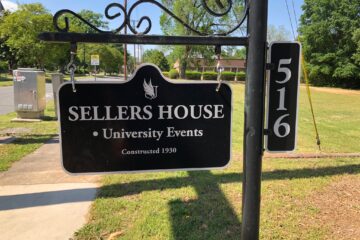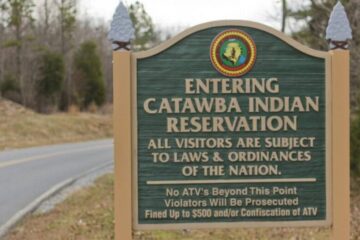John Holder, a professor in the department of political science, is retiring in May after 22 consecutive years in the profession. He began teaching at Winthrop in 1995, and left in 2005 to pursue his doctorate in public policy at the University of North Carolina at Charlotte.
He has been back consistently since 2012, and regularly tells students about how he paid for graduate school using the prize money he was awarded when competing on a December 2004 episode of Wheel of Fortune.
He is the fourth generation of his family to be a part of the Winthrop community. He attended the MacFeat Nursery School and Kindergarten as a child while his mother taught political science courses on campus. He also has ancestors who were on the Board of Trustees.
Throughout his own career, he has sought to provide students with the knowledge necessary to work within the system. This includes knowing how to organize precincts, mobilize voters, campaign and successfully create and pass bills to promote equity.
According to his LinkedIn profile, Holder has taught a variety of courses including Introduction to American Government, State and Local Government, Public Opinion, The Judiciary, The Congress and more.
He said that The Congress is his favorite class to teach. He co-taught it alongside Karen Kowdrewski before eventually taking it over, and particularly enjoys it because of its final project. The final imitates “simulations” similar to those conducted by model United Nations, where they form committees to write, debate and pass bills.
“The spring 2019 version of that class had eighty students in it, so we were able to form a House and Senate, multiple committees, and consider multiple bills. The people there included some of the most fun students I ever had. Instead of a final exam, we continued the simulation during the exam period. At the end, Dr. Mahony came in and did a ‘presidential bill signing’ of the bill that they’d passed. The students loved it, and so did I.”
He also encourages students to learn outside of the classroom as well. He advises them to practice self-care, and to be open to new possibilities.
“If you had told me the day that I graduated from college that I would end up spending more than 20 years as a professor, I would have thought you were insane. I started out as a Congressional staffer, and I originally planned to run for office, but I got over it. I would have been a terrible candidate,” he said, “Your education is a privilege that most people in the world don’t get. Use it to make the world a better place, however you define that.”
Over the years he interacted with many new faces, but one in particular that resonates with him is that of Shannon Barber. She was a non-traditional student who attended Winthrop in her thirties. She was known for her role as president of the College Democrats, and for her work with the local Democratic Party. However, over the duration of five classes, Holder got to know her more personally.
“Shannon and I used to joke about how many intersectionality boxes she checked off –she was a non-religious Black lesbian with a disability. She’d been discriminated against in all kinds of ways. She had every reason to be angry about a lot of things. But probably the proudest moment of my career was when she told me that I’d made her less cynical. That meant a lot.”
Barber died shortly after earning her Bachelor of Arts in political science in 2020.
He considers recent events like the 2000 presidential election and the 9/11 attacks particularly memorable.
“I had two classes that afternoon. We watched the news for a while and then just talked about what had happened. Two full classes of Winthrop students felt that we were now at war, and – including the women – felt that they were going to be drafted. Everyone in the room was terrified, including me. I hope I did something to help them deal with it,” he said, “Now it’s someone else’s turn.”
Holder said he appreciates diversity at Winthrop because of how it expands his perspectives. Whether it be pop culture, politics, or their intersection, his interactions with students have served as an opportunity to guide students through historical and current events and get their unique insight.



